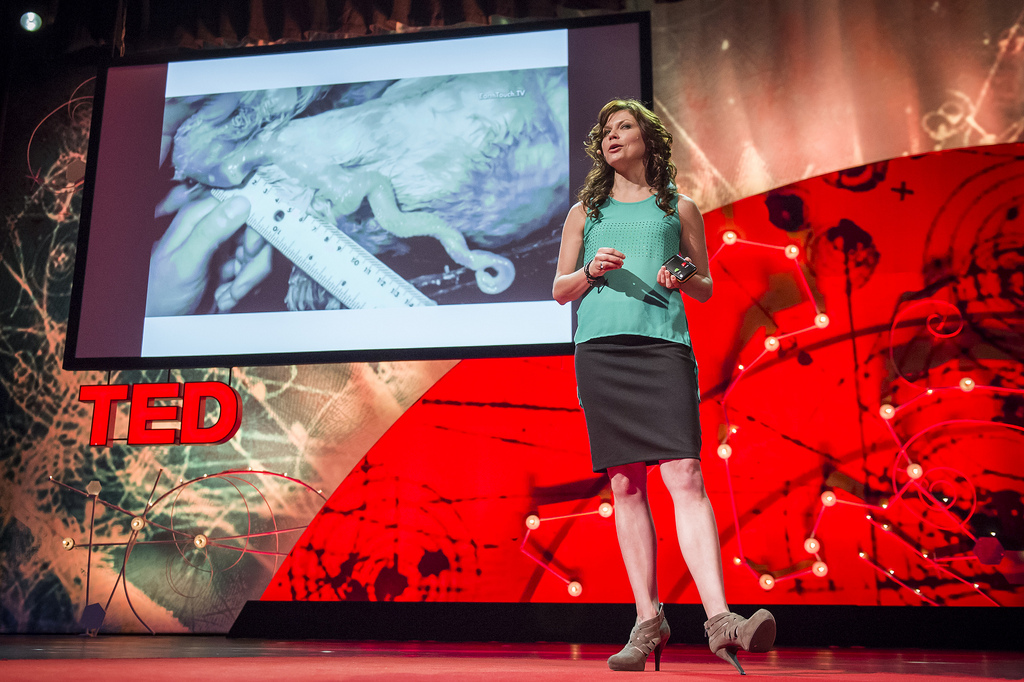
Carin Bondar explains the unusual shape of the duck penis at TEDGlobal 2013. This biologist studies sex in the animal kingdom. Photo: James Duncan Davidson
There’s wild sex. And then there’s sex in the wild — a topic that biologist and animal sex expert Carin Bondar has been talking about for years, spawning not only a book, The Nature of Human Nature, but also a popular web series, “Wild Sex,” all about the evolution of sexual behavior.
 Carin Bondar: The birds and the bees are just the beginning
In her funny and bold talk from TEDGlobal 2013, Bondar, who holds a Ph.D. in population ecology from the University of British Columbia, gets down and dirty, talking about everything from the barbed penises of male bedbugs to something she’s dubbed the “Magnum P.I. hypothesis,” which has to do with Mexican guppies and their mustaches. Trust us — you’ll want to watch this talk.
Carin Bondar: The birds and the bees are just the beginning
In her funny and bold talk from TEDGlobal 2013, Bondar, who holds a Ph.D. in population ecology from the University of British Columbia, gets down and dirty, talking about everything from the barbed penises of male bedbugs to something she’s dubbed the “Magnum P.I. hypothesis,” which has to do with Mexican guppies and their mustaches. Trust us — you’ll want to watch this talk.
The TED Blog caught up with Bondar, who says of her work, “Who could have ever guessed the world is as obsessed with kinky animal sex as I am?” Below, an edited transcript of our conversation.
First thing’s first: How did you get into this line of work?
It’s not a very typical line of work, I guess. It started when I was a stay-at-home mom. I started blogging and playing around with ideas, and I found that my audience responded most enthusiastically to sex — and especially kinky, weird sex.
Were you always talking about animal sex, or were you writing about human sex too?
It’s always been about animals, because I’m a biologist through and through. To be able to pull what I do off, you need a strong background in evolution, behavioral ecology, social biology and more. But this is storytelling as well.
You say that human lives are influenced by what goes on in the animal kingdom — how so? And why is it important to explain animal sex to the masses?
One of my main goals in everything I do is to open people’s eyes to the fact that we are primates — we are a part of the animal kingdom. A lot of humans feel as if we’re quite separate, but we’re not. I want to increase both awareness and appreciation for the natural world and the organisms in it, because there are still so many people who are so removed from biology and from the animal kingdom.
Your Magnum P.I. hypothesis made me laugh out loud, based on name alone. Have you coined any other clever terms in order to explain this kind of sex to the masses?
Magnum P.I. is definitely one of my best ones. Maybe that could be the topic of my next book: sexual terms that I can introduce to the world. A lot of the examples that I use rely heavily on our ability to imagine and use anthropomorphism. It’s a really cool way to learn.
Why is sex still such a divisive topic in society?
I don’t know. And another really hot potato is the issue of non-monogamy. Humans are the only — and I’ll say that again — the only animals to follow a sexual monogamy. Other animals, even though we might call them monogamous, that might mean “monogamous through a breeding season” or it might mean “socially monogamous” where partners hang out with each other year after year, but they’re certainly having sex with other animals.
So if you had to say which species has the wildest sex in the wild, is there one that you can think of?
Yes. And it is the primate to whom we are most closely related: the bonobo. We are equally related to chimps and bonobos, and bonobos basically have sex all the time. They basically solve all conflicts with sex. They are a completely peaceful society, but any time there is any sort of conflict, they just start having sex. And we’re talking about groups, homosexual sex, sex within families, between siblings, males-females, males-males, female-females, that sort of thing. And they do it all: oral sex, penetration, sex with their hands …
You say that animals, including humans, spend a lot of time thinking about sex; do they get “horny?”
Yes, absolutely! And a lot of animal sex is non-reproductive. Another case of misinformation is that animals just have sex to reproduce, which is certainly not the case. Something like 98% of sex that male giraffes have is with other male giraffes. There’s a strong prevalence of homosexuality — and I like to be the person who goes, “Well, maybe it just feels good!” Certainly there are other more biologically relevant explanations, like expelling older sperm or gaining experience or being on whichever level of a dominant hierarchy; but you know, come on! We can’t discount the fact that maybe it just feels awesome. We know that all mammals are capable of orgasm.
Have you ever had anyone walk out on one of your speeches? They can get pretty racy …
I have, but I’m not sure if it’s because they were insulted or if they just had to go to the bathroom or something. I mean, there are definitely haters, as with anything. It’s not subject matter for everybody. But that’s okay. This is a free world, and you’re welcome to not listen.
Comments (4)